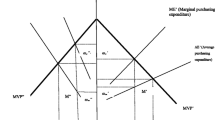Abstract
This paper analyzes the role played by intermediation in a decentralized market, where trade is carried out through bilateral bargaining, and where the bargaining outcome depends on the process of search for suitable trading partners. To this purpose, a monopolistic intermediary is embedded in a dynamic model of random-matching and two-sided search with heterogeneous agents. It is shown that intermediation might speed up the matching process and might induce separation of the agents’ types, thus enhancing sorting efficiency with respect to a pure search market, where sorting externalities cause multiplicity of equilibria to arise and determine inefficient matching outcomes. Nonetheless, intermediation might also introduce frictions that do not exist in a decentralized market operating in isolation, and this impairs efficiency.
Similar content being viewed by others
References
Bloch F and Ryder H (2000). Two-sided search, marriages and matchmakers. Int Econ Rev 41: 93–115
Burdett K and Coles MG (1997). Marriage and class. Q J Econ 112: 141–168
Diamond PA (1982). Wage determination and efficiency in search equilibrium. Rev Econ Stud 49: 217–227
Diamond PA (1987). Consumer differences and prices in a search model. Q J Econ 102: 429–436
Gehrig T (1993). Intermediation in search markets. J Econ Manag Strategy 2: 97–120
Jackson M and Palfrey T (1998). Efficiency and voluntary implementation in markets with repeated pairwise bargaining. Econometrica 6: 1353–1388
Lu X, McAfee P (1996) Matching and expectations in a market with heterogeneous agents. In: Baye M (ed) Advances in applied microeconomics, vol 6. JAI Press, Connecticut, pp 121–156
Mortensen D (1982). Property right and efficiency in mating, racing and related games. Amer Econ Rev 72: 968–979
Mortensen D (1982). The matching process as a non-cooperative bargaining game. In: Mac Call, JJ (eds) The economics of information and uncertainty, pp 91–105. University of Chicago Press, Chicago
Mortensen D and Wright R (2002). Competitive pricing and efficiency in search equilibrium. Int Econ Rev 43: 1–20
Rust J and Hall G (2003). Middlemen vs market makers: a theory of competitive exchange. J Polit Econ 111: 353–403
Sattinger M (1995). Search and the efficient assignment of workers to jobs. Int Econ Rev 36: 283–302
Shimer R and Smith L (2000). Assortative matching and search. Econometrica 68: 343–369
Spulber DF (1996). Market making by price-setting firms. Rev Econ Stud 63: 559–580
Spulber DF (2002). Market microstructure and the incentives to invest. J Polit Econ 110: 352–381
Wooders J (1997). Equilibrium in a market with intermediation is walrasian. Rev Econ Des 3: 75–89
Yavaş A (1994). Middlemen in bilateral search markets. J Labor Econ 12: 406–429
Author information
Authors and Affiliations
Corresponding author
Rights and permissions
About this article
Cite this article
Burani, N. Matching, search and intermediation with two-sided heterogeneity. Rev Econ Design 12, 75–117 (2008). https://doi.org/10.1007/s10058-008-0039-6
Received:
Accepted:
Published:
Issue Date:
DOI: https://doi.org/10.1007/s10058-008-0039-6



